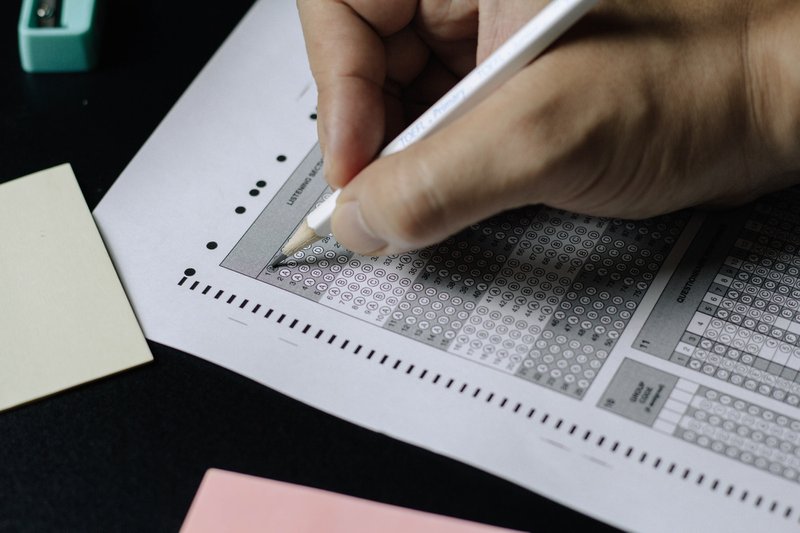
In this article, CollegeAdvisor.com admissions expert Finn covers standardized testing as well as test prep strategies. For more help with building a college admissions strategy and guidance on the college application process in general, sign up for a monthly plan to work with an admissions coach 1-on-1.
Like much of the college admissions process, standardized testing can be confusing and hard to navigate. Is the SAT or ACT better? What is the College Board? Are SAT Subject Tests still happening? If you’re in your Junior year of high school, it’s a perfect time to start thinking about the world of standardized testing. Here at CollegeAdvisor.com, we’ve taken a test or two and have some helpful tips to get you started on your testing journey!
Standardized Testing Overview
For Juniors, there are a few key tests that you will need to think about. These tests are the SAT, the ACT, the SAT Subject tests, the AP Exams, and the IB Exams, as well as the TOEFL if English is your second language.
The SAT
The SAT (formerly “Scholastic Assessment Test”) is the most famous of the standardized tests. It is a 3 hour long test, with 400 being the lowest score and 1600 being the highest. It consists of four main sections: the Reading Test, the Writing and Language Test, the Math Test – Calculator, and the Math Test – No Calculator. Though the number of questions varies per portion, the Reading/Writing and the Math sections each equal 800 points, totaling 1600. Like many other College tests and processes, the SAT is owned and managed by the College Board.
The ACT
The ACT, short for American College Testing, is an alternative assessment test serving a similar purpose as the SAT. Unlike the SAT, the ACT focuses on English, Math, Reading, and Science, the latter being one of major differences from the SAT. The ACT is graded on a scale from 1 to 36. Additionally, the average time per question on the ACT is between 30 seconds and one minute depending on the section. On the SAT, however, students have an average of 1 minute and 10 seconds per question – more time than any section of the ACT.
Choosing between SAT and ACT
When choosing between the SAT and the ACT, it’s important to consider both the timing and the subjects. The SAT gives students more time to think, but the questions may take more time than the ACT questions. Unlike the SAT, the ACT also has a science section, not to mention some slight differences in the types of math covered.
Without having encountered either test, however, it’s difficult to know which will suit you better—some students take both. At CollegeAdvisor.com, we recommend that you do a practice run of both tests before deciding which to take.
Test-optional admissions
Recently, there has been a movement towards test-optional admissions. Certain colleges no longer require SAT or ACT scores for admission. With the onset of the COVID-19 Pandemic, many schools have adopted some version of such a policy, including MIT, Harvard, and Stanford. Policies like these are exciting for many—for some, they can make it seem easier to get into college. However, they also make the qualitative aspects of your application that much more important.
The SAT Subject Tests and Essays are going away
With the COVID-19 pandemic, the College Board has announced that they will no longer offer the SAT Subject Tests or SAT with Essay after June of 2021. Previously, students could take SAT Subject Tests, which were multiple-choice tests focusing on a single subject. Likewise, students could take an additional essay after their SAT which was then graded and included in their score.
Luckily, you will not need to worry about such things, since these tests will no longer be expected. The college application process is demanding, and the College Board recognizes that, stating, “As students and colleges adapt to new realities and changes to the college admissions process, College Board is making sure our programs adapt with them. We’re making some changes to reduce demands on students.”
AP Exams
AP exams, or Advanced Placement exams, are tests which typically come at the end of an academic year. They go hand-in-hand with Advanced Placement classes, although students do not need to have taken an AP class in order to take an AP test and vice versa (although certain schools may require them). That being said, we would recommend that students take an AP course in conjunction with an AP exam—self-studying for AP Exams can be quite difficult. These tests vary depending on the subject, so be sure to check the official guidelines to figure out what your test will look like.
IB Exams
Similar to AP exams, there are class-based exams known as IB (International Baccalaureate) Exams, which also cover specific topics. IB Exams are taken as part of a diploma program at a student’s high school. Check with your guidance counselor to figure out if you can participate in an IB program and what that may look like. In the admissions process, selecting a rigorous course load is just as important as your GPA, so consider taking AP and IB classes if your school offers them.
When to take the SAT or ACT
The SAT and ACT tests take place on certain standardized testing days. You can find more info on the dates for testing here: SAT [Also includes links to register for tests] and ACT [Registration link].
We recommend that students take the SAT in the spring of their junior year and take it one to two more times before applying to college, depending on your score. If you are satisfied with your score, congratulations! You don’t need to take the SAT or ACT anymore!
You can look up the average scores for your dream schools to get an idea of what score you might be satisfied with—keep in mind, though, that there is often much deviation from that listed average. Although important, you are more than your SAT or ACT score, so it’s never productive to obsess over it at the end of the day.
If you are not satisfied with your SAT or ACT score, we recommend studying more (see below) and then retaking the test when you think you’re ready. Hopefully, at this point, you’ll see some kind of improvement. If you see a big improvement from score one to score two but still aren’t satisfied, take the test a third time!
If, on the other hand, you don’t see a jump in score, chances are the third sitting for the SAT or ACT will not be helpful. Taking the SAT or ACT more than 3 times between junior year and applying to college usually isn’t helpful either—the score you get after three tries is often the best score you’ll be able to achieve through self-studying.

Standardized Testing Strategies
Practice, practice, practice!
The best way to study for any standardized test is to take practice tests. The one thing that consistently shows up with students who succeed on standardized tests is the number of practice tests they have taken. This trend is consistent across countries and across tests.
Some of the best resources you’ll find are Khan Academy for the SAT and Barron’s test prep books. Khan Academy partnered with the College Board to create an online platform that creates responsive practice tests that show you where you could use improvement.
If you’d prefer a pen-and-paper option, Barron’s test prep has a number of books available on the SAT and ACT as well as many AP courses. Both Khan Academy and Barron’s practice tests tend to skew slightly more difficult than the actual test, so you’ll be well prepared on the actual testing day.
Emulate the Environment
To that end, when studying for the SAT, emulate the testing environment that you’ll find yourself in on testing day. The more familiar you are with the actual settings of the test, the better you’ll perform. That means no music, no loud environments, time yourself appropriately, no eating, or getting up, etc. If you know that you will take tests in your school’s auditorium with a really loud fan (or equivalent), find something that can imitate that potential distraction. You want to be as well acclimated to the test and testing conditions as possible so that test day feels like a breeze.
Study smarter and check yourself
When completing practice tests, review your results carefully. Be sure to review both what you got wrong and what you got right. You want to know what you got wrong so that you can improve your score in the future, but it’s important to know what you did correctly once so you can recreate that success. By reviewing your correct answers, you confirm your knowledge and gain a more stable understanding of the topic at hand.
If you continue to struggle with practice tests or real tests, there are a few strategies that may help you improve your scores:
First of all, if you know what specific problems trip you up, talk to a teacher of that subject about the problem. Your teachers are likely willing to help explain the problem to you, and they might just help you bump up your score to where you need it to be.
I remember as a junior running through the halls of my school in a crazed frenzy because I didn’t know how mathematical series worked. Finally, one of the math teachers helped me out and made me feel more confident in my ability to complete the SAT accurately.
Secondly, take a Method Test Prep course in either the SAT or ACT. Method’s online courses feature 25 hours of preparation for both the SAT and the ACT, and come with audio, video, quizzes, explanations, and a vocabulary builder! By registering with CollegeAdvisor.com, you get free access to the Method Test Prep self-guided course.
Standardized Testing: Final Thoughts
Standardized testing can be a difficult time for everyone. When I was a junior, I took the AP Language and Composition exam, and I mixed up the minute hand and the hour hand. Upon discovering that I had only 5 minutes left in my exam as opposed to the 25 I thought I had, I filled out “B” for the final 15 multiple choice questions. It was so stressful and disheartening, but in situations like those, you kind of have to laugh. And, hey, I still got into Harvard despite not knowing how to read a clock at 17 years old.
Finally, I leave you with two rather unusual tips. The first is chewing gum. Chew a certain flavor of gum when you study for a standardized test, and chew the same kind of gum when you take the actual exam. For some reason, students do better when they have an olfactory reinforcement when they go from studying to test-taking. Second, find a ritual that you can repeat before each exam. Before I took any standardized test or exam, I would eat salmon on the basis that it was “brain food.” Although the salmon itself was likely not helping me do any better on my test, I really appreciated having a testing ritual that helped me feel grounded.
This article on standardized testing was written by Finn Bamber, Harvard ‘22. If you want to get help with your college applications from Finn or other CollegeAdvisor.com Admissions Experts, register with CollegeAdvisor.com today.

